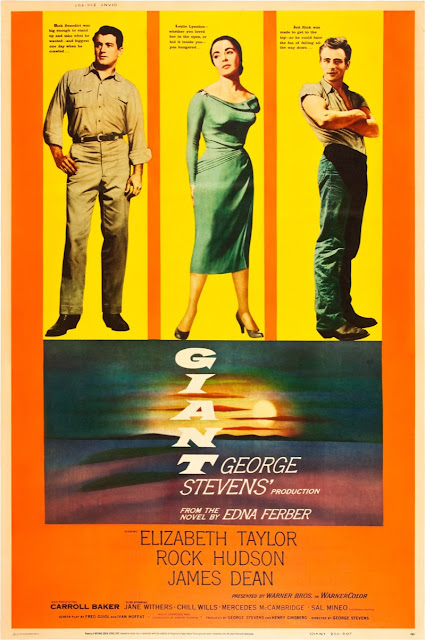Giant (1956) ***1/2
I had seen Giant (1956) once before, over 15 years ago, and I didn't remember much about it at all. In that sense, this viewing was like watching it for the first time. I have to say that it feels antiquated for a 2020 viewing. But I'm sure in its day it felt like a slap in the face to the old school "values" of Texas.
Giant, based on Edna Ferber's 1952 novel, is an epic film that contains a lot of big ideas about topics like racism, misogyny, modernization, and capitalism but it never quite explores any in a fully satisfactory manner. It still manages to feel intimate—despite its expansive Western landscapes—focusing on the life, family, and associates of cattle rancher Jordan "Bick" Benedict Jr. (Rock Hudson). Leslie (Elizabeth Taylor) becomes Bick's wife early on in the film and James Dean (who was tragically killed in a car accident before the film was released) plays the foil, Bick's neighbor Jett Rink (love that name), who through luck (and spite) manages to become rich when striking oil on his small piece of land.
Much of the film plays out like a classic 1930s or '40s family drama so there is a certain tameness about Giant, but there are also some wonderful scenes where firecracker Taylor gets to speak her mind to her husband and his male friends, who exclude her from their "men talk." She also gets involved in the welfare of their Mexican neighbors, much to Bick's chagrin. It's a bummer though that Leslie, so much a driving force early in the film, has so little to do in the second half, basically serving as an observer by then.
Hudson is good too, serviceable in his part, but my least favorite, of the leads. Dean is at his handsomest and mumbly best—it's a shame that he only had three credited film roles. He really could have had a long, varied career, and we never got to see his acting evolve. A young Dennis Hopper and Carroll Baker (just months away from her controversial star turn in Baby Doll (review)) show up later as the children of Bick and Leslie, when Hudson and Taylor then act the remainder of the film in very unconvincing old age makeup.
Giant feels a bit like a 1950s version of There Will Be Blood (2007) (review) except romanticized and minus the cynicism (picture a progressive instead of regressive Gone With The Wind (1939)). Giant may have been progressive for its time and that progressiveness can still be recognized, but the film is a bit too long (just shy of 3 1/2 hours), a bit too meandering—wandering between characters—and the infamous "race commentary" diner scene near the finale plus the final scene that follows are handled clumsily. Still, it's a very enjoyable piece of cinema.
Giant, based on Edna Ferber's 1952 novel, is an epic film that contains a lot of big ideas about topics like racism, misogyny, modernization, and capitalism but it never quite explores any in a fully satisfactory manner. It still manages to feel intimate—despite its expansive Western landscapes—focusing on the life, family, and associates of cattle rancher Jordan "Bick" Benedict Jr. (Rock Hudson). Leslie (Elizabeth Taylor) becomes Bick's wife early on in the film and James Dean (who was tragically killed in a car accident before the film was released) plays the foil, Bick's neighbor Jett Rink (love that name), who through luck (and spite) manages to become rich when striking oil on his small piece of land.
Much of the film plays out like a classic 1930s or '40s family drama so there is a certain tameness about Giant, but there are also some wonderful scenes where firecracker Taylor gets to speak her mind to her husband and his male friends, who exclude her from their "men talk." She also gets involved in the welfare of their Mexican neighbors, much to Bick's chagrin. It's a bummer though that Leslie, so much a driving force early in the film, has so little to do in the second half, basically serving as an observer by then.
Hudson is good too, serviceable in his part, but my least favorite, of the leads. Dean is at his handsomest and mumbly best—it's a shame that he only had three credited film roles. He really could have had a long, varied career, and we never got to see his acting evolve. A young Dennis Hopper and Carroll Baker (just months away from her controversial star turn in Baby Doll (review)) show up later as the children of Bick and Leslie, when Hudson and Taylor then act the remainder of the film in very unconvincing old age makeup.
Giant feels a bit like a 1950s version of There Will Be Blood (2007) (review) except romanticized and minus the cynicism (picture a progressive instead of regressive Gone With The Wind (1939)). Giant may have been progressive for its time and that progressiveness can still be recognized, but the film is a bit too long (just shy of 3 1/2 hours), a bit too meandering—wandering between characters—and the infamous "race commentary" diner scene near the finale plus the final scene that follows are handled clumsily. Still, it's a very enjoyable piece of cinema.


Comments
Post a Comment